Kallikreins are a subgroup of serine proteases, enzymes capable of cleaving peptide bonds in proteins. In humans, plasma kallikrein (KLKB1) has no known paralogue, while tissue kallikrein-related peptidases (KLKs) encode a family of fifteen closely related serine proteases. These genes are localised to chromosome 19q13, forming the largest contiguous cluster of proteases within the human genome. Kallikreins are responsible for the coordination of various physiological functions including blood pressure, semen liquefaction and skin desquamation.
Tissue kallikrein is an enzyme. This enzyme catalyses the following chemical reaction

Kallikrein-2 is a protein that in humans is encoded by the KLK2 gene, and is particularly associated with prostatic tissue.

Plasma kallikrein is a protein that in humans is encoded by the KLKB1 gene.

Semenogelin-1 is a protein that in humans is encoded by the SEMG1 gene. The protein encoded by this gene is the predominant protein in semen. The encoded secreted protein is involved in the formation of a gel matrix that encases ejaculated spermatozoa. The prostate-specific antigen (PSA) protease processes this protein into smaller peptides, with each possibly having a separate function. The proteolysis process breaks down the gel matrix and allows the spermatozoa to move more freely. Two transcript variants encoding different isoforms have been found for this gene.

Kallikrein-10 is a protein that in humans is encoded by the KLK10 gene.
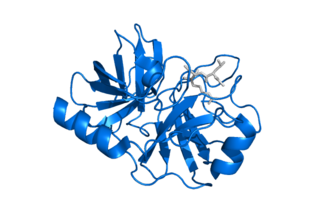
Kallikrein-related peptidase 5 (KLK5), formerly known as stratum corneum tryptic enzyme (SCTE), is a serine protease expressed in the epidermis. In humans it is encoded by the KLK5 gene. This gene is one of the fifteen kallikrein subfamily members located in a cluster on chromosome 19. Its expression is up-regulated by estrogens and progestins. Alternative splicing results in multiple transcript variants encoding the same protein.

Kallikrein-related peptidase 4 is a protein which in humans is encoded by the KLK4 gene.
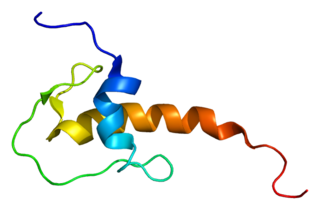
Lympho-epithelial Kazal-type-related inhibitor (LEKTI) also known as serine protease inhibitor Kazal-type 5 (SPINK5) is a protein that in humans is encoded by the SPINK5 gene.

Kallikrein-11 is a protein that in humans is encoded by the KLK11 gene.
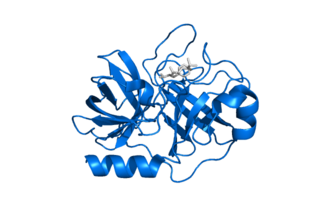
Kallikrein-related peptidase 7 (KLK7) is a serine protease that in humans is encoded by the KLK7 gene. KLK7 was initially purified from the epidermis and characterised as stratum corneum chymotryptic enzyme (SCCE). It was later identified as the seventh member of the human kallikrein family, which includes fifteen homologous serine proteases located on chromosome 19 (19q13).
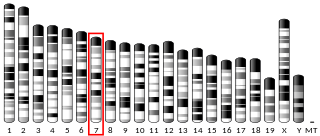
Kallikrein-13 is a protein that in humans is encoded by the KLK13 gene.
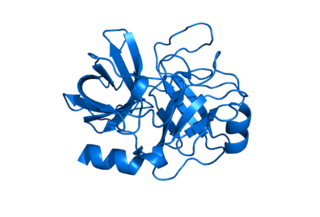
Kallikrein-8 is a protein that in humans is encoded by the KLK8 gene.

Kallikrein-14 is a protein that in humans is encoded by the KLK14 gene.

Kallikrein-15 is a protein that in humans is encoded by the KLK15 gene.

Kallikrein-12 is a protein that in humans is encoded by the KLK12 gene.

Kallistatin is a protein that in humans is encoded by the SERPINA4 gene.

Kallikrein-related peptidase 9 also known as KLK9 is an enzyme which in humans is encoded by the KLK9 gene.
Sunflower trypsin inhibitor (SFTI) is a small, circular peptide produced in sunflower seeds, and is a potent inhibitor of trypsin. It is the smallest known member of the Bowman-Birk family of serine protease inhibitors.
Kallikrein 8 is an enzyme. This enzyme catalyses the following chemical reaction














